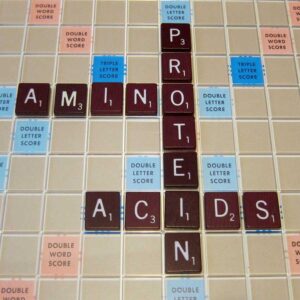Americans give a great deal of thought to protein. Grocers and health food stores serve up a wide variety of protein drinks, protein powders, and protein bars. Several weight loss “experts” tout the benefits of high-protein, low-carbohydrate diets. Elite athletes credit protein for their impressive musculature. But is protein really worth all that fuss?
 Without a doubt, we could not survive without protein. Our bodies build a wide variety of proteins using amino acids per instructions encoded in our DNA. There are nine essential amino acids which must be included daily in the foods we eat. Our bodies can manufacture the remaining eleven nonessential amino acids should they be absent from our diets.
Without a doubt, we could not survive without protein. Our bodies build a wide variety of proteins using amino acids per instructions encoded in our DNA. There are nine essential amino acids which must be included daily in the foods we eat. Our bodies can manufacture the remaining eleven nonessential amino acids should they be absent from our diets.
Protein’s primary function is to build and repair tissue. This role takes on elevated importance during periods of rapid growth, intense exercise, and recovery from injury or surgery. Protein also supports immune function, synthesizes enzymes, acts as a chemical messenger, serves as a transport mechanism, and maintains fluid balance by preventing leakage in the space between cells. In a pinch, protein can provide a source of energy if the body lacks sufficient carbohydrates for the tasks at hand. However, nutrition expert Roberta Anding likens this usage to burning $100 bills in a fireplace to heat a room. It’ll take care of business but reflects a really poor use of resource.
Our bodies need daily deposits of amino acids; we don’t store them. Beef, poultry, fish, dairy products, and soy have been deemed “complete proteins” as they serve up adequate quantities of all nine essential amino acids. Folks who pursue a whole food plant based diet get the requisite quantity of essential amino acids eating a variety of complementary foods – e.g., rice and beans, peanut butter and whole wheat bread. Such foods need to be eaten over the course of a day; they don’t have to be combined at every meal.
So, how much protein do we need?
The Daily Reference Intake (DRI) for a normal adult’s daily protein intake is .8 grams per kilogram of body weight, or .36 grams per pound. That figure translates into 54 grams of protein for the average 150-pound adult. According to Anding, endurance athletes need 1.2-1.4 grams of protein per kilogram of body weight (g/Kg) per day, and strength-training athletes need 1.6-1.8 g/Kg per day. Infants and adolescents also need elevated protein intake: 2 g/Kg daily for infants, and 1 g/Kg daily for adolescents.
How much protein are we getting?
According to a survey by the American Journal of Clinical Nutrition, our average daily protein intake came to 56+14 grams in young children, 91+22 grams in adults, and 66+7 grams in the elderly. Unfortunately, excess protein does not translate into elevated function. If eaten in lieu of carbohydrates, it creates inefficiency in the production of energy. If it simply amounts to excess daily calories, it contributes to weight gain.
According to Dr. T. Colin Campbell, if you are a “normal” adult and follow a balanced whole food plant based diet, you will get the right amount of protein in a form that is least disruptive to the body’s controlled alkaline blood serum. If, on the other hand, you like being an omnivore, take a lesson from the world’s longest-lived human beings. Consider limiting your intake of meat, poultry, fish, eggs, and dairy to 10% or less of daily calories.